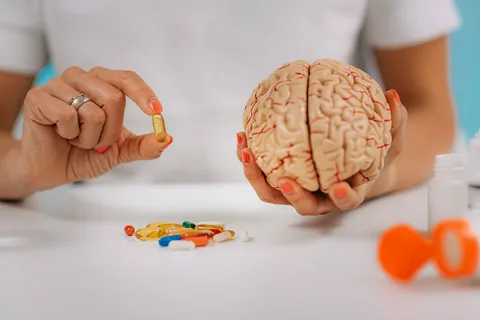Nootropics, commonly referred to as “smart drugs” or “cognitive enhancers,” have become a focal point of interest for individuals seeking to optimize brain function and support long-term cognitive health. These substances, which can be either natural or synthetic, are believed to enhance cognitive abilities such as memory, focus, and mental clarity. This guide explores the role of nootropics in brain health and longevity, examining their mechanisms, benefits, and potential risks.
What Are Nootropics?
Nootropics are compounds that are thought to improve cognitive function in healthy individuals. Unlike conventional stimulants, which can enhance performance in a more generalized way, nootropics are believed to specifically target cognitive processes such as learning, memory, and executive function. The term “nootropic” was coined in 1972 by Romanian psychologist Corneliu E. Giurgea, who defined these substances as compounds that enhance learning and memory, support brain function under adverse conditions, and have minimal toxicity.
Types of Nootropics
Nootropics can be broadly classified into several categories:
1. Natural Nootropics
These include herbal supplements, vitamins, and other naturally occurring substances. Common examples include:
- Ginkgo Biloba: Believed to improve blood flow to the brain and enhance cognitive function.
- Panax Ginseng: Often used to boost energy levels and improve mental performance.
- Rhodiola Rosea: Known for its adaptogenic properties, which may help reduce fatigue and enhance cognitive function.
2. Synthetic Nootropics
These are artificially created compounds designed to enhance cognitive abilities. Examples include:
- Modafinil: A wakefulness-promoting agent often used to treat sleep disorders, and known for its cognitive-enhancing effects.
- Piracetam: One of the earliest nootropics, purported to improve memory and learning.
- Noopept: A peptide-derived nootropic believed to enhance memory and cognitive function.
3. Racetams
A class of synthetic nootropics that are often used for cognitive enhancement. Racetams include:
- Aniracetam: Known for its potential to improve memory and reduce anxiety.
- Oxiracetam: Believed to enhance learning and memory, with potential stimulating effects.
Mechanisms of Action
Nootropics can impact brain health and function through various mechanisms:
1. Neurotransmitter Modulation
Many nootropics influence neurotransmitter levels, which can affect mood, memory, and cognitive function. For instance, substances that increase levels of acetylcholine, a neurotransmitter involved in learning and memory, can enhance cognitive performance.
2. Neuroprotection
Some nootropics offer neuroprotective benefits by reducing oxidative stress and inflammation in the brain. This can help protect against neurodegenerative diseases and support overall brain health.
3. Cerebral Blood Flow
Certain nootropics improve blood flow to the brain, which can enhance cognitive function and support brain health. Improved circulation can also lead to better delivery of nutrients and oxygen to brain cells.
Benefits of Nootropics
The potential benefits of nootropics are diverse and can include:
1. Enhanced Memory
Many nootropics are believed to support memory function, making it easier to recall information and learn new material.
2. Improved Focus and Concentration
Some nootropics can enhance the ability to focus and concentrate, which is particularly useful for tasks that require sustained attention.
3. Increased Mental Clarity
Nootropics may help improve mental clarity, allowing for clearer thinking and better decision-making.
4. Reduced Cognitive Decline
Certain nootropics have neuroprotective properties that may help reduce the risk of cognitive decline and support long-term brain health.
Risks and Considerations
While nootropics offer potential benefits, they also come with risks and considerations:
1. Side Effects
Some nootropics can cause side effects such as headaches, insomnia, or gastrointestinal issues. It’s important to understand these risks before starting any new supplement.
2. Interactions with Medications
Nootropics may interact with other medications, potentially altering their effectiveness or increasing the risk of adverse effects. Always consult with a healthcare provider before combining nootropics with prescription medications.
3. Long-Term Effects
The long-term effects of many nootropics are not well-studied. It’s essential to consider the lack of long-term data when evaluating their safety and efficacy.
4. Quality and Purity
The quality and purity of nootropic supplements can vary. Choosing reputable brands and ensuring products are tested for purity can help mitigate some risks.
Practical Tips for Using Nootropics
If you are considering incorporating nootropics into your routine, keep the following tips in mind:
1. Start with Low Doses
Begin with the lowest effective dose to assess how your body responds. Gradually increase the dosage if necessary and monitor for any adverse effects.
2. Consult a Healthcare Professional
Always consult with a healthcare provider before starting any new supplement, especially if you have underlying health conditions or are taking other medications.
3. Focus on a Healthy Lifestyle
Nootropics should complement, not replace, a healthy lifestyle. Ensure you maintain a balanced diet, regular exercise, and adequate sleep to support brain health.
4. Research Thoroughly
Do thorough research on any nootropic you are considering. Look for reputable sources of information and check for scientific studies that support the claims.
FAQs
What are the most popular nootropics for cognitive enhancement?
The most popular nootropics include Modafinil, Piracetam, Noopept, and various natural supplements like Ginkgo Biloba and Panax Ginseng. Each has different mechanisms of action and potential benefits.
Are nootropics safe to use long-term?
The long-term safety of many nootropics is not well-established. It’s important to use them cautiously and consult with a healthcare provider to evaluate their suitability for long-term use.
Can nootropics help with memory and learning?
Many nootropics are believed to enhance memory and learning by improving neurotransmitter function and neuroprotection. However, individual responses can vary.
Do nootropics have side effects?
Yes, some nootropics can have side effects, such as headaches, insomnia, or gastrointestinal issues. It’s important to monitor your body’s response and adjust dosages as needed.
How do natural nootropics compare to synthetic ones?
Natural nootropics are derived from plants and herbs and are often perceived as safer with fewer side effects. Synthetic nootropics, on the other hand, may offer more targeted effects but can come with higher risks.
Can nootropics improve focus and concentration?
Certain nootropics have been reported to enhance focus and concentration, making it easier to complete tasks that require sustained attention.
Are there any risks associated with combining nootropics with other medications?
Yes, nootropics can interact with other medications, potentially affecting their effectiveness or increasing the risk of adverse effects. Always consult a healthcare provider before combining nootropics with other drugs.
What role do nootropics play in preventing cognitive decline?
Some nootropics offer neuroprotective benefits that may help reduce the risk of cognitive decline and support long-term brain health. However, more research is needed to fully understand their effectiveness in this area.
How can I choose the right nootropic for me?
Choosing the right nootropic involves considering your specific cognitive goals, potential side effects, and interactions with other substances. Researching different options and consulting with a healthcare provider can help you make an informed decision.
Are there any non-supplemental ways to support brain health?
Yes, maintaining a healthy lifestyle through a balanced diet, regular exercise, adequate sleep, and mental stimulation is crucial for supporting brain health. Nootropics can be a supplement to these efforts but should not replace foundational health practices.
Conclusion
Nootropics hold promise for enhancing brain function and supporting cognitive health and longevity. While they offer potential benefits, including improved memory, focus, and mental clarity, they also come with risks and considerations. By understanding their mechanisms, benefits, and potential side effects, and by adopting a cautious and informed approach, individuals can better navigate the use of nootropics as part of their overall strategy for optimal brain health.

